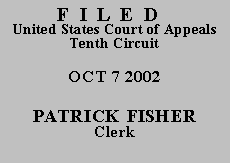

| UNITED STATES OF AMERICA, |
|
This is a pro se appeal under 28 U.S.C. § 2255. Theomas Rhodes pleaded guilty to one count of conspiring to possess with intent to distribute more than 50 grams of cocaine base. See 21 U.S.C. §§ 841, 846. Subsequently, however, Mr. Rhodes filed a motion to withdraw his guilty plea. The district court denied the motion and Mr. Rhodes appealed. This court affirmed the denial of his motion to withdraw the plea and rejected his claim that the district court tried to "chill" his right to assert entrapment as a sentencing defense. United States v. Rhodes, No. 99-2124, 2000 WL 963173 (10th Cir. July 12, 2000).
In his § 2255 motion, Mr. Rhodes (1) asserts ineffective assistance of both his pretrial and sentencing counsel and (2) contends that his sentence should be vacated under Apprendi v. New Jersey, 530 U.S. 466 (2000), because it was enhanced based on factors not charged in the indictment and not submitted to the jury. The district court, relying on the magistrate judge's thorough report and recommendation, denied Mr. Rhodes' motion.
Mr. Rhodes now asks this court to issue a certificate of appealability. In order for this court to grant a certificate of appealability, the moving party must make "a substantial showing of the denial of a constitutional right." 28 U.S.C. § 2253 (c)(2). To make such a showing, the party must show that "reasonable jurists could debate whether (or, for that matter, agree that) the petition should have been resolved in a different manner or that the issues presented were adequate to deserve encouragement to proceed further." Slack v. McDaniel, 529 U.S. 473, 484 (2000) (internal quotation marks omitted). Mr. Rhodes fails to make this showing.
To establish that his counsel was constitutionally ineffective, Rhodes must prove that his counsel's performance was deficient and that he was prejudiced by that deficiency. Strickland v. Washington, 466 U.S. 668, 687 (1984). Because he pleaded guilty, Rhodes must show that there is a reasonable probability that he would not have entered a plea and would have insisted on proceeding to trial if his counsel had not been ineffective. Hill v. Lockhart, 474 U.S. 52, 59 (1985). But in claiming ineffective assistance, Mr. Rhodes makes only conclusory and speculative allegations, unsupported by facts or law. Although a pro se litigant's pleadings are to be construed liberally, Whitney v. New Mexico, 113 F.3d 1170, 1172 (10th Cir. 1997), this court "will not supply additional factual allegations . . . or construct a legal theory on [the litigant's] behalf." Id. at 1174.
Mr. Rhodes' Apprendi claim also fails. "Apprendi does not apply to sentencing factors that increase a defendant's guideline range but do not increase the statutory maximum." United States v. Sullivan, 242 F.3d 1248, 1256 (10th Cir. 2001). In this case, Mr. Rhodes' enhanced sentence was within the statutory range of the offense for which he pleaded guilty. Thus, Apprendi is inapplicable.
We have reviewed Mr. Rhodes' brief, the magistrate judge's recommendation, the district court's order, and the record on appeal. Mr. Rhodes' pleadings fail to satisfy the requirements of 28 U.S.C. § 2253(c)(2). Therefore, for substantially the same reasons set forth by the magistrate judge in his Proposed Findings and Recommended Disposition of April 24, 2002, we DENY Appellant's request for a certificate of appealability and DISMISS the appeal.
Entered for the Court
Harris L Hartz
Circuit Judge
*.This order and judgment is not binding precedent, except under the doctrines of law of the case, res judicata, and collateral estoppel. The court generally disfavors the citation of orders and judgments; nevertheless, an order and judgment may be cited under the terms and conditions of 10th Cir. R. 36.3.